#lets be naturalist together bro
Text
People think Lord Debling is boring, but as someone who is in love with and fascinated by the same things, he'd be the perfect person to info dump with. Then he'd leave me alone for three years and let me live my life and study my own interests deeper? He's perfect.
#Bridgerton#lord debling#lets be naturalist together bro#lets talk about birds#and plants#and trees#let's ESPECIALLY talk about trees#I am begging
27 notes
·
View notes
Text
Restless Rewatch: The Untamed Episode 11 second part
(Masterpost) (Other Canary Absurdity)
Warning: Spoilers for All 50 Episodes!
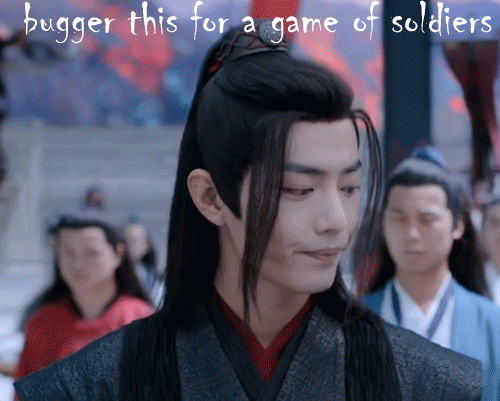
Message from the Lan Clan
After dinner the Yunmeng bros go to talk to Jiang Fengmian in his study. They're quiet and respectful here, with no shoulder-shoving or arguing. This scene has such Brady Bunch energy, where Dad's Study is the Man Place where boys come to talk about Serious Things.
The boys tell Dad Jiang about the Yin Iron and he says yeah, I know. This is probably why he let them run off on their road trip without punishing them, but he could have, like, shared data with them so they might have actually achieved something related to the Yin Iron, rather than just wandering around the countryside bonding with Lan Wangji and Nie Huaisang.
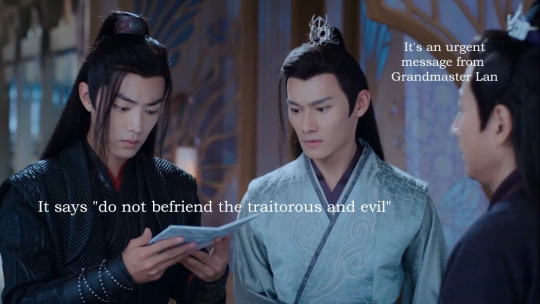
He shows them a letter from the Lans that basically says the Lan Clan is in the shit, and he tells them they've got to go to the Wen indoctrination because otherwise they will also be in the shit.
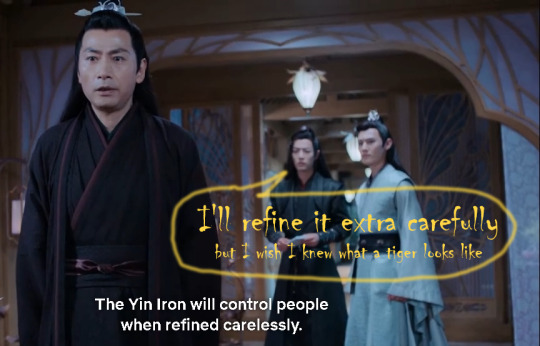
He gives the boys a warning about the Yin Iron, which is that
1. it can be refined and
2. if you refine it carefully, it will not control you.
Awesome tip, will definitely use, thanks pop.
(more behind the cut)
Jiang Cheng wants to argue about going to the Wen party, but Wei Wuxian vocally gets on board, not leaving any opportunity for whining.
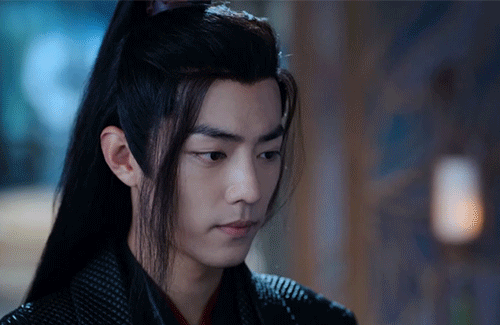
Wei Wuxian is only sucking up a little bit in this scene. He obviously has a lot of affection for Jiang Fengmian, but WWX doesn't play up to his favoritism nearly as much as he could. Compare, for example, how he leans into Yanli's preferential treatment of him.
Fight Outside the Cold Cave
Over on the Gusu side of the country province township, the disciples have gathered outside the cold cave that previously none of them knew about, and Su She is freaking out.
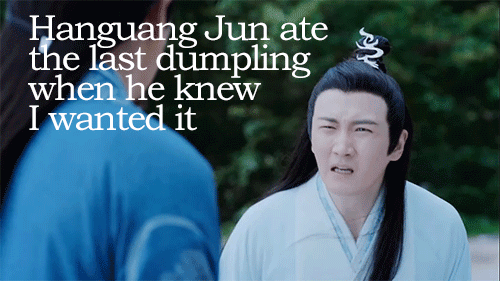
Most of the acting in The Untamed is naturalistic, but then there are occasional characters who are portrayed with a much more theatrical, broad style. Su She's villainy is not given a lot of layers; he's playing a type, more than a person.
Many of the villains in The Untamed are played this way, but not all. Wen Zhuliu, for example, is a genuinely horrifying bad guy while also conveying depth and ambivalence--despite having hardly any lines. And JGY is a masterpiece of a performance. For Su She, the directors or the actor have opted for "sniveling backstabber" as a type, which is unfortunate, because it robs his final scenes of emotional impact.
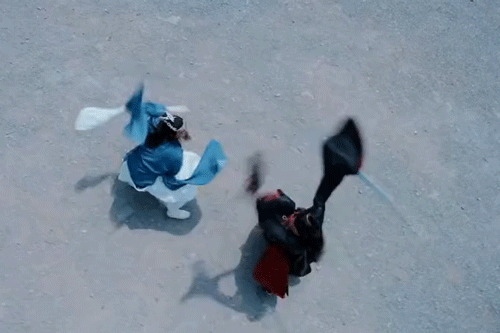
Lan Qiren tells the disciples to get to safety. He rushes forward, gamely getting his ass kicked by human cuisinart Wen Xu. He's not as effective a warrior as either of his nephews but he's a brave S.O.B.
Hanguang Jun to the Rescue
Before things can go completely pear-shaped, Lan Wangji sails in with his guqin.
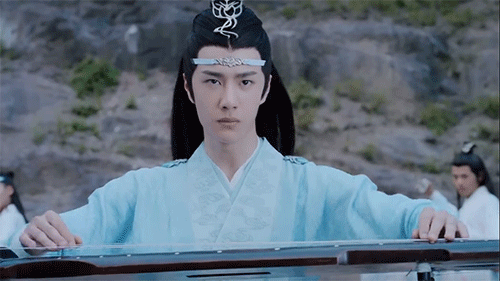
The Blue Steel technique of the Lan Clan
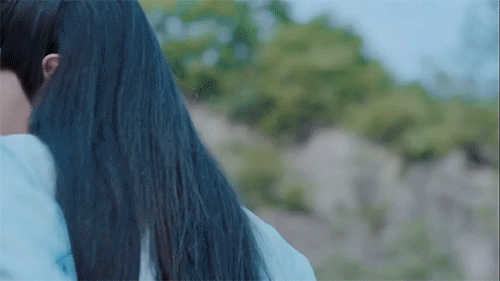
Like many gifted learners, Lan Wangji's musical abilities are more advanced than his social skills. Here he musically makes the ground literally explode, almost as if it had been specially rigged with incendiary charges.
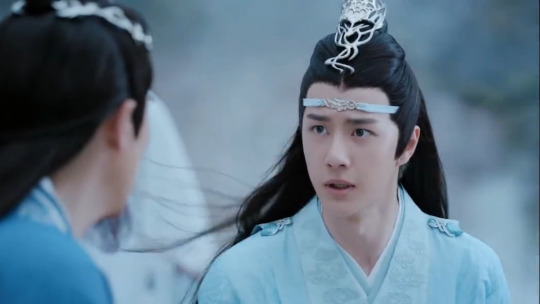
Lan Wangji is very pretty when he's worried, and his affection and concern for his uncle is touching. He's 100% not interested, as we will see, in Lan Qiren's whole "lets all die for the future of the Lan Clan while my nephews hide" agenda. He's on his own agenda of smiting the wicked and protecting the weak.
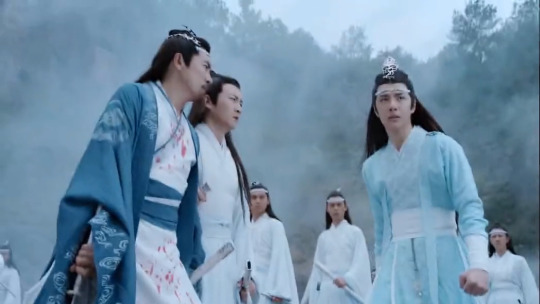
Notice how Su She is standing right next to Lan Qiren here, even holding his arm? The next thing that Lan Qiren says is to tell all the disciples to keep up as they run into the cave. Somehow Su She totally does not keep up, and he gets caught outside along with a bunch of other disciples.
Giving Up
Wen Xu and his men kill most of the other caught disciples, and then threaten Su She, asking him how to get into the cave. In fear for his life, he tells them. Not cool, Su She, but possibly forgivable. Although when you voluntarily join a, you know, battle cult, physical courage is kind of an important qualifier.
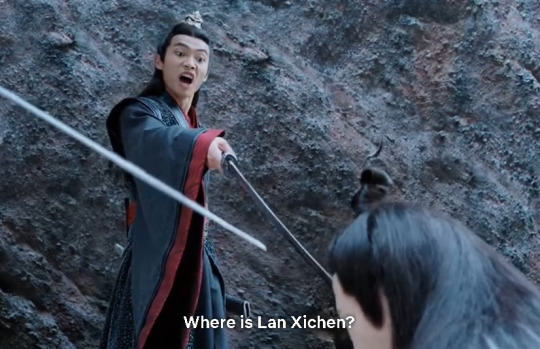
But this shit here...
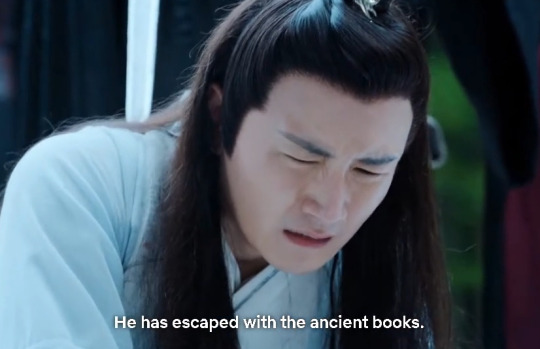
They didn't fucking ask about the books, douchebag.
Su She was there in Lan Qiren's house when the two heads of his clan knelt to each other, each claiming the right to be the one to stay behind and die. And he heard Lan Qiren say that the ancient books are the foundation of the clan and that only if LXC and the books survive, will the clan continue. By giving up both men, and pointing out the book situation, Su She has totally earned his expulsion.
Lan Wangji Takes a Stand
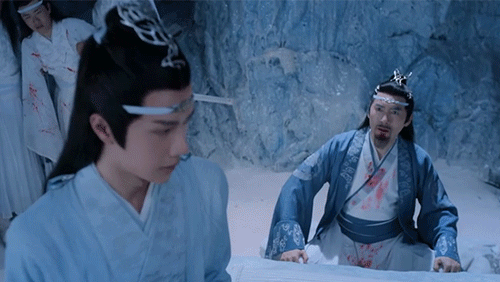
Lan Wangji decides, for the first but not last time, to openly defy his uncle...and it's got nothing to do with Wei Wuxian. Lan Wangji is a hero, who follows the dictates of his conscience. His conscience is extremely filial and extremely orthodox, but he’s got a growing open-minded streak. This is going to cause a whole lot of conflicts for him over the next few years.
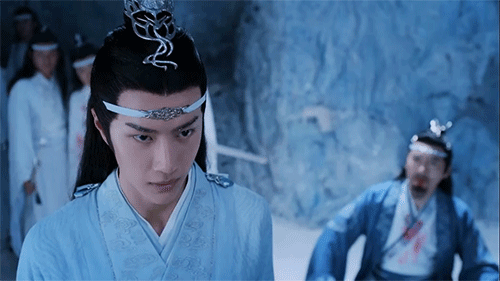
This time, however, he manages to skate out from under the whole disobedient, unfilial thing by citing Lan Yi's directive, which means Lan Qiren has to accept it because she's his predecessor and elder relative (She is probably not a literal ancestor, since she spent her life in a cave putting fucking headbands on fucking rabbits which probably didn’t leave time for having babies).
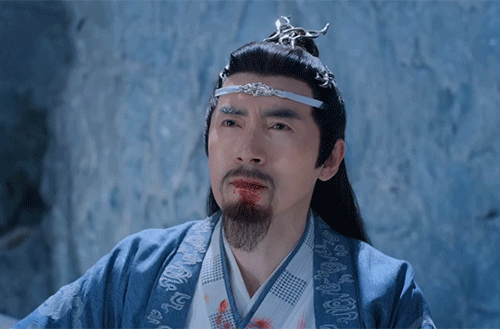
This is a pretty extraordinary moment for Lan Wangji and for Lan Qiren, because Lan Wangji just asserted his own form of authority to do the exact opposite of what Lan Qiren wanted, and Lan Qiren just sucked it up and let him.
It's also very different from western stories involving a holy McGuffin such as the Yin Iron. Lan Wangji's solution of "fuck it, just let the bad guys have it, it's not worth so many people dying for" is refreshing and surprising to me, a westerner raised on The One Ring, the Grail, the Death Star Plans, etc.
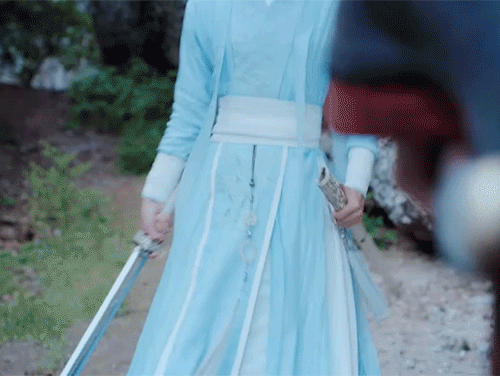
Lan Wangji steps out of the cave and uses a sword blast to save Su She, the ungrateful bastard, from getting stabbed by Wen Xu. Then he surrenders, and they break his leg to slow him down. This does not actually incapacitate him, because he is Lan Fucking Wangji, already a BAMF at like 17 years old. When they whack his leg, his chunk of Yin Iron falls out onto the ground.
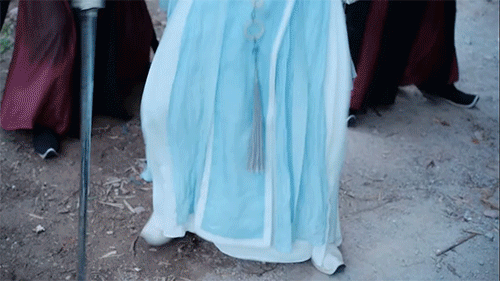
That thing was in a magic bag of holding before. So...it just falls out when you whack him? If they whack him again will his guqin fall on the ground? What about candy?
Archery Practice at Lotus Pier
Meanwhile, back at Lotus Pier, the brothers are enjoying some quality time together before they head to the hostage-taking indoctrination.
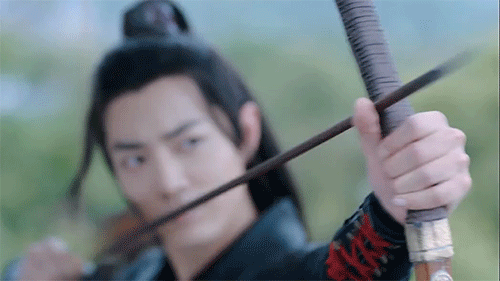
Wei Wuxian is such a great cultivator that he can hit a distant target even when he jerks his bow upwards as he releases the arrow.
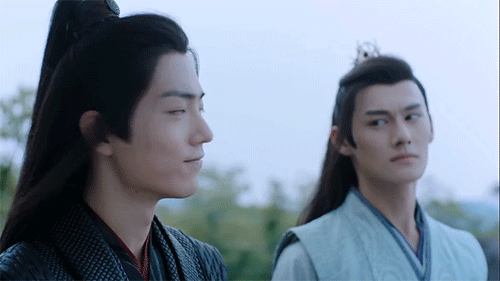
Jiang Cheng seems fairly pleased, and proud of his brother. He's competitive and fundamentally grumpy but not, at least here, a sore loser.
Club Ruohan
We go over to Da Club, where Wen Ruohan is yelling at Wen Qing for letting Lan Wangji and Wei Wuxian go. He names them both, so they're becoming more and more known to their enemies. Which is not a good thing.
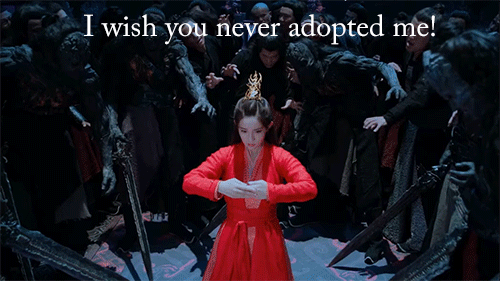
He menaces her with the zombie mosh crew, having them kill a dude in front of her and then saying her baby brother will be next in the circle of zombies if she tries any more stunts. Neither of them can imagine how much zombie ass her baby brother is going to kick, later in his (un)life.
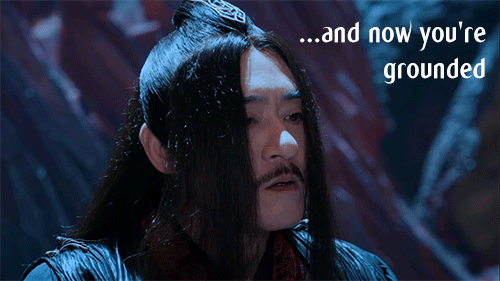
Side note: What is up with WRH’s hair? Why bother pulling your hair up over your ears if you're going to leave an enormous curtain of it over your face? It's because he knows there's a wind machine next to his throne, isn’t it?
Leaving Lotus Pier
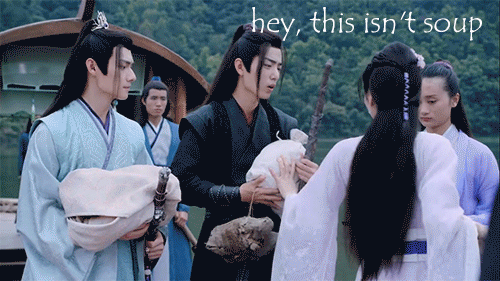
Jiang Cheng: when I ran off earlier in the year on my road trip you didn't pack a goddamn thing.
Wen Indoctrination
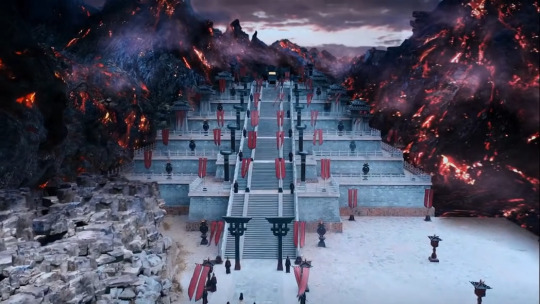
Is it even possible to stand next to this much active volcanic shit and not, uh, die? I live in the tornado part of the US so I don't know much about lava (yet. 2020 still has 2 months to go). But it seems like it would be hard to breathe the air. Also they appear to build houses on lava piles, which seems imprudent. I say that even as someone who plays The Elder Scrolls Online, which is full of lava towns and nonsense like “ash farming.”
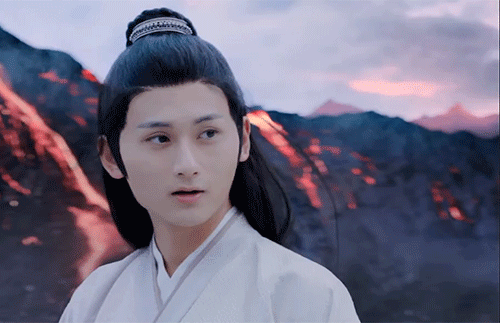
Nie Huaisang is adorable at all times, but particularly here, when he's so happy to see his friend who *didn't* fuck his gege and then abandon him without an explanation.
Nie Huaisang: I'm so glad I can count on Wei-Xiong to be consistent and not vanish for months, or become a traumatized shell of his former self, or, like, horribly die.
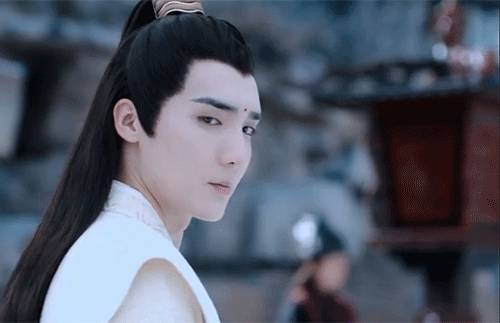
Jin Zixuan isn't quite as happy to see Wei Wuxian.
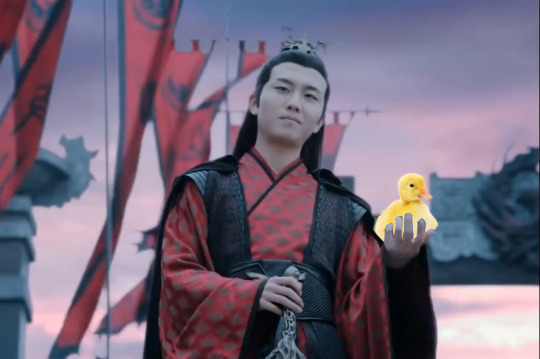
Wen Chao enjoys the sound of his own voice way too much, and is malevolent and boring. On the plus side, he likes to stand with his hand stuck out in the air, which is fun for your resident photoshopper.
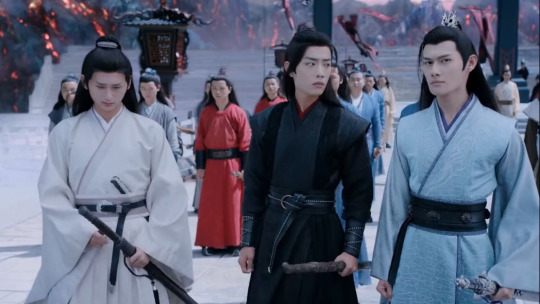
Nie Huaisang is so miserable every time he's holding a sword, or blade, or whichever we're supposed to call this. He's got his fan tucked into his belt, which is sweet. He is happy to give up his sword but don't you dare try to take his fan.
Meanwhile Wei Wuxian is worried about Lan Wangji, and Jiang Cheng isn't.
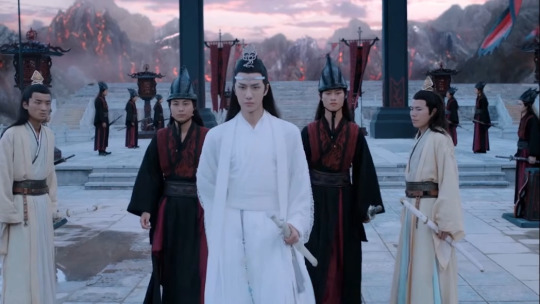
Lan Wangji shows up under guard, and takes his position at the front of the line, but without any extra disciples. The Wens let him change into snowy white robes after breaking his leg which will go well with arterial blood spray. He's focused and is determined not to interact with Wei Wuxian in this public context.
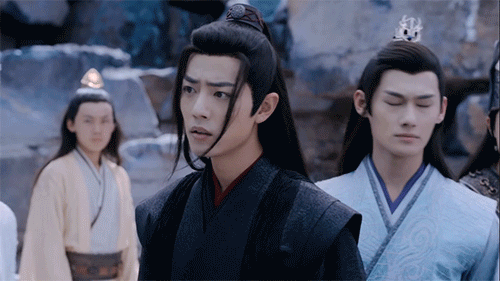
When I was little, I would sit near my best friend at church on Sunday, but not be allowed to talk to her until church was over, and it was exactly like this. She was good at churching and I was hyper and hated church. We are still best friends and these things are still true.
This interaction is like a thumbnail for the whole dynamic of these three boys: Lan Wangji outwardly ignoring Wei Wuxian while having many interior feelings about him; Wei Wuxian demanding attention and creating a bit of a scene, due to his very genuine caring; Jiang Cheng telling him to leave that boy alone for fuck's sake.
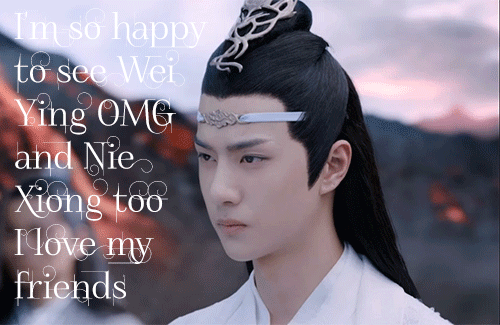
Lan Wangji: Stop trying to talk to me Wei Ying, I’m busy composing a song in my head about the two of us and our love for each other.
#fytheuntamed#the untamed#the untamed gifs#the untamed meta#wei wuxian#lan wangji#jiang cheng#lan qiren#su she#jiang fengmian#restless rewatch the untamed#canary3d-original#my gifs#the untamed spoilers
329 notes
·
View notes
Text
The Golden Boy, John Garfield By Susan King

Stanley Kowalski in Tennessee Williams’ A Streetcar Named Desire was Marlon Brando’s signature role. It made the then 23-year-old Brando an overnight Broadway sensation in 1947, and he electrified movie audiences and earned his first Oscar nomination for the classic 1951 film version. But he wasn’t the first choice to play Blanche’s earthy brother-in-law. Producer Irene Selznick had her eyes on Hollywood star John Garfield, who frequently took time out from movies to return to the Great White Way for limited runs.
In fact, writer John Lahr reported in 2014 that on July 19, 1947, Selznick drew up a contract for the 34-year-old actor, “one of the few sexy Hollywood stars with a proletarian pedigree. The Selznick office leaked the big news to the press. The contract was never signed. On August 18 the deal with Garfield collapsed.”
One of the reasons bandied about was that Garfield turned down the role because the contract would have kept him away from Hollywood for too long. Though Brando is considered the performer who ushered in the more naturalistic style of acting (known as “the Method”) both on stage and in film, truth be told it was Garfield who was the catalyst for Brando, as well as Montgomery Clift, Paul Newman, James Dean and Steve McQueen.
Just look at Garfield’s first feature film, FOUR DAUGHTERS (’38). Directed by Michael Curtiz, the cast includes Lane sisters Lola, Rosemary and Priscilla, in addition to Gale Page as the four musically inclined daughters of a widower music professor (Claude Rains). Enter handsome boy-next-door Jeffrey Lynn as a budding composer named Felix who endears himself with all the daughters, especially peppy Ann (Priscilla Lane).
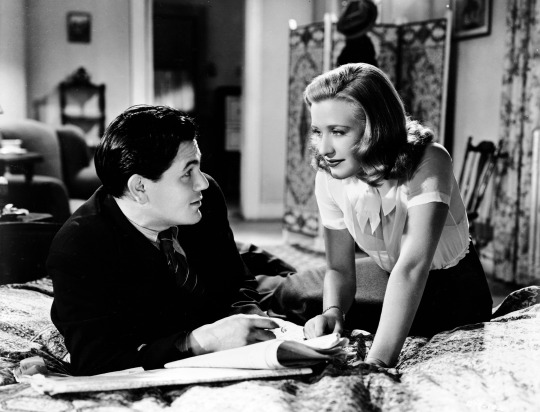
The household is put in an uproar with the arrival of Garfield’s Mickey Borden, the original rebel anti-hero. Unkempt, slovenly and possessing a massive chip on his shoulder, Mickey is an orchestrator who has arrived at the house to work with Felix. You can’t keep your eyes off him especially in this early monologue where he explains his anger to Ann:
“They’ve been at me now nearly a quarter of a century. No let-up. First, they said, ‘Let him do without parents. He’ll get along.’ Then they decided, ‘He doesn’t need education. That’s for sissies.’ Then right at the beginning, they tossed a coin, ‘Heads he’s poor, tail’s he’s rich.’ So, they tossed a coin…with two heads. Then for the finale, they got together on talent. ‘Sure, they said, let him have talent. Not enough to let him do anything on this own, anything good or great Just enough to let him help people. It’s all he deserves.’”
There was a sexuality and eroticism to Garfield’s performance that was 180 degrees different from Lynn’s durable and safe leading man. He was so natural; it was almost like someone found Garfield walking down the street in the Bronx and asked him to star in the movie. “He was the prototypical Depression rebellion youth,” actor Norman Lloyd told me about Garfield for the L.A. Times in 2003. They first met in 1937 and worked together on Garfield’s final film HE RAN ALL THE WAY (’51).
“He combined all of these elements of darkness and rebelliousness with the charm and the poignancy and he became the prototypical actor of that time. He never changed as a person. He remained just as a wonderful guy. He was a man of great charm, a good fellow, very likable.”
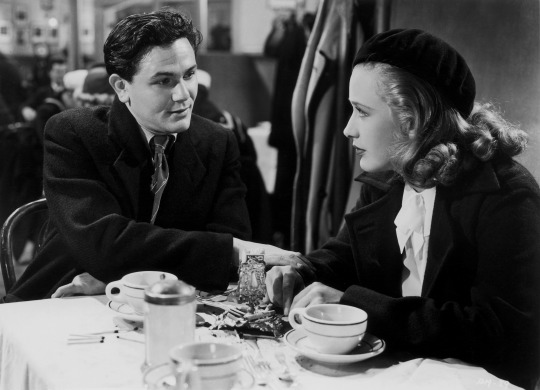
There was a lot of Mickey in Garfield, who was born Jacob Julius Garfinkle in 1913 on the Lower East Side of New York to poor Russian immigrants. Julie, as he was called, had a rough and tumble upbringing. His mother died when he was seven. “He hated his father,” his daughter Julie Garfield noted in 2003. “His father was awful to him. He was torn away from his brother.” In fact, Garfield once said that if he hadn’t become an actor, he would have been “Public Enemy No. 1.”
Unlike Mickey, the fates and destiny were looking after him. First, it was educator Angelo Patri, who became a surrogate dad to Julie at P.S. 45, a high school for troubled students. With Patri’s encouragement, he joined the debate team where he discovered he had a gift for acting. That was further nurtured when he received a scholarship to Maria Ouspenskaya’s acting school. He was all of 18 when he made his Broadway debut in 1932 in Lost Boy and became the youngest member of the progressive and influential Group Theatre, appearing in Clifford Odets’ early masterpieces Waiting for Lefty and Awake and Sing.
Odets wrote the play Golden Boy for Garfield in 1937, but director Harold Clurman decided to give the lead role of boxer Joe Bonaparte to Luther Adler and cast Garfield in a minor role. His unhappiness with Clurman’s decision pushed Garfield into signing a contract with Warner Bros. And FOUR DAUGHTERS made him an overnight sensation. He earned a Supporting Actor Oscar nomination, but lost to Walter Brennan who picked up his second Academy Award in that category for Kentucky (‘38).
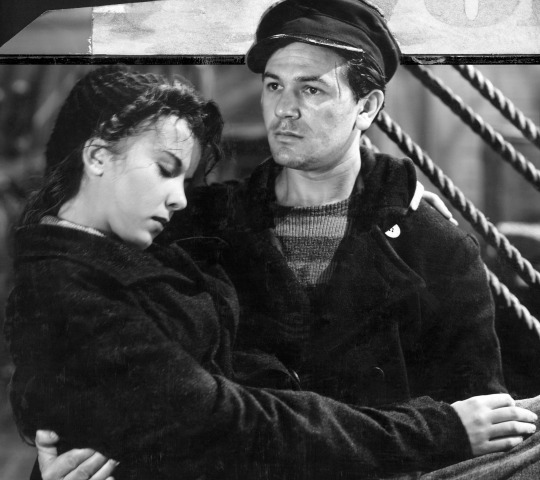
The following year, Garfield, Rains, the Lane siblings, Page and Curtiz reunited for DAUGHTERS COURAGEOUS, in which the actors played different characters from the prior film. It was probably the best film Garfield made that year. But Warner Brothers put him in a lot of movies that were unworthy of his talent including BLACKWELL’S ISLAND (’39) where he was typecast as a gangster. He made some good movies in 1941, including THE SEA WOLF, which also starred Edward G. Robinson and Ida Lupino and reunited him with Curtiz, and also Anatole Litvak’s atmospheric noir OUT OF THE FOG also with Lupino.
Because he suffered heart damage from scarlet fever, Garfield couldn’t serve during World War II. But he entertained the troops on USO tours and opened the famous Hollywood Canteen with Bette Davis so the troops could be entertained and be served by some of Hollywood’s biggest stars. Both Davis and Garfield appeared as themselves in the hit 1944 film HOLLYWOOD CANTEEN. Garfield also fought the global conflict on screen, giving one of his strongest and grittiest performances in PRIDE OF THE MARINES (’45), a poignant drama based on the life Al Schmid who was blinded by a grenade during the Battle of Guadalcanal. He returns home to his wife (Eleanor Powell) a bitter, doubting man who has a difficult time trying to deal with his new life.
The year 1946 saw the release of two of Garfield’s most enjoyable films HUMORESQUE and THE POSTMAN ALWAYS RINGS TWICE. HUMORESQUE was his last film under his Warner Bros. contract. It’s a delicious melodramatic wallow with Garfield playing a poor New York kid who becomes a famous concert violinist. Joan Crawford, coming off her Oscar-winning triumph in Mildred Pierce (’45), plays a wealthy patroness who sets her sights on Garfield. Garfield went to MGM for POSTMAN, which was based on James M. Cain’s best-selling thriller. Garfield turns up the heat with Lana Turner as illicit lovers who brutally murder her husband only to turn on each other when they are caught.
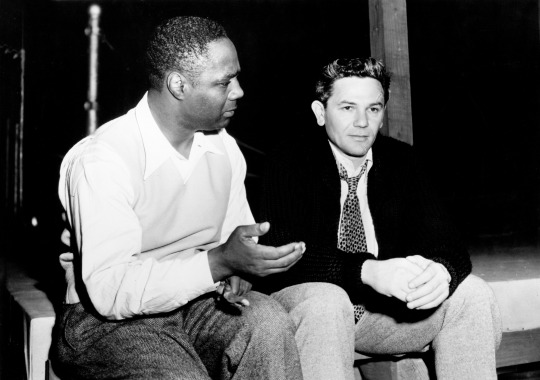
The actor teamed up with Bob Roberts to form an independent production company, Enterprise Productions, and their first feature was the boxing classic BODY AND SOUL (’47), for which he earned his second Oscar nomination as Charley Davis, a boxer who loses his way when he gets involved with an unscrupulous promoter. Not only does he have a strong chemistry with leading lady Lilli Palmer, but also African American actor Canada Lee as Ben, a boxer with brain damage. And Garfield gets to utter one of his greatest lines in BODY AND SOUL: “What are you going to do? Kill me? Everybody dies.”
Though his next Enterprise production wasn’t a hit, FORCE OF EVIL (’48), co-written and directed by Abraham Polonsky, is a terrific film noir with a hard-hitting Garfield as a corrupt attorney trying to save his numbers-racket brother (Thomas Gomez) from his gangster boss. Garfield returned to Warner Bros. and Curtiz in 1950 for THE BREAKING POINT, which was based on Hemingway’s 1937 novel, To Have and Have Not. It’s an outstanding film noir with a superb performance from Garfield as well as from Black actor Juano Hernandez who plays his partner on the fishing boat.
THE BREAKING POINT was Garfield’s penultimate film and was not a hit because The Blacklist was engulfing Hollywood and the actor, despite the fact he wasn’t a Communist. His film career was over in 1951 when he refused to cooperate with HUAC at his hearing. Before his death of a heart attack in 1952 at the age of 39, Garfield did appear in a short-lived Broadway revival of Golden Boy, which also starred Lee J. Cobb, a young Jack Klugman and Joseph Wiseman.
Though she was only 6 ½ when he died, Julie Garfield recalls seeing her father on stage in Golden Boy where he introduced her during the curtain call. “When he smiled at you it was like being in the sun,” she noted. “He was funny and sometimes he would like to dance and kick up his legs. I remember him adoring me. He used to take me to the merry-go-round a lot in New York. He was so strong, so handsome and he loved to kid me. He would give me this mischievous smile. I wish I remembered more about him…”
#John Garfield#Method Acting#Marlon Brando#Golden Boy#theatre acting#The Sea Wolf#Body and Soul#Four Daughters#Susan King#TCM#Turner Classic Movies#Huac#blacklist
91 notes
·
View notes
Text
IF THE GODS HAD TUMBLR BLOGS
Aphrodite: You think you’ve seen a feminist blog? Think again. There are ~tasteful~ pictures of nipples left and right, quotes about body image and lots of empowered women. The title is: freethenip_keepthewhip Rupi Kaur would probably deem the blog too much, but somehow she manages to keep it to a sane level. Everyone follows her, even tho they all deny it. 10/10 inspirational as fuck
Hermes: He runs: yaboy-hermesss This blog is a mess. There is no such thing as a theme, or any kind of cohesion, the boy just reblogs what he likes. That’s it, that’s the only rule. It’s a shame he mostly only blogs when he’s high, so it’s a game of “will today be a motivational quotes over colorful sunsets OR Low-resolution pictures of literal houseplants in the dark” kinda day? 7.5/10 – if you’re high too, it’s the best thing you’ve seen all year
Dionysus: AKA: yourdaddywouldnever. The blog is pretty tame, it’s mostly just memes and an occasional photo of the latest shenanigans he’s gotten into. But he likes everything. EVERYTHING. From cat pics on Hephaestus’ blog to random selfies of Indian dudes, it seems like Dio uses the like button every time he takes a breath. 5.5/10 the blog itself is really mediocre
Hephaestus: Pictures. Of. Cats. Just so many cat pics. He recently began adding gifs to the mix. He names every kitten, and his tags are full of things like #fluff #meow #furryfriends. There is an occasional photo of him posing (but pretending to be natural) and some of those memes your aunt would post on facebook, tagged with three crying-laughing faces. The name is: hephaestus1 – “hephaestus was already taken” 9/10 gotta admit the kitties are cute as fuck
Hestia: Poetry blog. She uploads her own stuff and reblogs quotes from others, but the main purpose of tumblr for her is to get into debates about meaningless stuff in the comments. Her blog’s name is: lines_of_revolution 6.5/10 the poems are not bad actually, but for the love of everything, don’t tag her
Ares: His blog is mainly black and white images. He tries to maintain an aesthetic but sometimes it is too much for ADHD boiTM, and he spirals into a pit of sad and miserable quotes only. But when he’s doing good, the pictures are a very decent way of telling what mood he is in, and actually tell a pretty good story of his week. The blog name is: ares-godofwar 8/10 when he’s fine
Artemis: This is The Aesthetic Blog TM. Everything matches with everything. She keeps up themes that change every month, and there is not a post that’s out of order. The blog is so aesthetically pleasing, legends say you can not look at it for more than 15 minutes at a time or your life will fall apart and nothing will ever seem worthy of looking at again. Her blog is: goddessofperfection
Apollo: There is no good way of putting it, Apollo’s blog is a good ol’ pornblog. He strongly argues and puts it as some kind of “artistic choice” or “naturalistic expression” but that’s no way of fooling anyone when there are more naked butts on his page than on Burning Man. His username is: harp_me_up (he spent 3 weeks coming up with this name) 5/10 for the denial (just admit it bro)
Demeter: She runs: demeter-dontmakeatumblrplease. Now listen. I don’t have any explanation for this. But her blog is the funniest shit ever. In the history of time, it is the most hilarious thing to grace this blob of stone we call Earth. It is just straight up hysterical. It resonates with everyone. The things she reblogs and the things she posts herself. Quality content. This is what I’m here for. And by myself I mean everyone ever. 100000/10 would recommend
Athena: Song lyrics everywhere. She probably thinks the site is a knockoff karaoke bar. Her blog is the equivalent of every single time a song has gotten stuck into your head for two days. Besides that, it’s usually “intellectual” stuff such as quotes from famous thinkers, but just when you think there is more to that than annoying lyrics, a line from I Wanna Know What Love Is pops up and the illusion is ruined. Her blog is: itsa-kindof-magic 5/10 pretty boring (sorry)
Persephone: Pretty convinced that her site (queen_of_the_dead) is just a cover for some serious satanic shit. It’s straight up scary. Can’t really give a rating, cuz I’ve only looked it up once and it still haunts be, but let’s go with a 10/10 not to piss her off.
Hera: It’s a pretty standard hipster blog with the trademark pics of cozy coffee shops and those backpacks (you know, the ones you see on the back of a dude with a beard longer than your last relationship) in every color imaginable. The blog is: mom_friend101 It’s cute and sweet and reflects her personality very well. Lot’s of rolled up pants to reveal crazy patterned socks. All around great vibes. 9/10
Hades: Ah yes, the dog rating site. “how many TIMES DO I HAVE TO TELL YOU THAT IT’S NOT A DOG RATING…!!” Ssssh, Hades, it’s okay. We all have a soft spot. A for effort for posting some other stuff once every month or so just to keep up the illusion. But it is what it is. His blog is: not-a-dog-rating-site JK, it’s actually: hatethis_hades 10/10 because it’s the best thing to come out of the grumpy old man (the dude gives every dog a max score)
Poseidon: Doesn’t get the concept of it, regularly confuses tumblr with twitter and posts his opinions nobody asked for. His username is: better-than-zeus, and he begins every single one of his posts with “Now guess what…” a strong 8/10 because he is actually pretty funny but no one will admit it, so don’t bring it up
Zeus:
AKA: zeusofficial Only posts about twice a year and it is always a link to some other site or article you know you’ll never read. -100/10, this is not your granddad’s facebook page, get it together man
#aphrodie#hermes#dionysus#hephaestus#hestia#ares#artemis#apollo#demeter#athena#zeus#poseidon#persephone#hades#keeping-up-with-the-olympians#gods#greek#greek gods#mythology
443 notes
·
View notes
Photo

© Paolo Dala
The Art Of Video Games
I am not a gamer. If anything, I tend to be overwhelmed by and fearful of the addictive immersive-ness of video games, but the first time I saw this game ‘Monument Valley’, I was completely and utterly mesmerized, by its spare beauty, its M. C. Escher-like sequence of pathways and structures and ladders, that this quiet little person deftly navigates and unlocks. I was not just entertained, I was moved. It was poetic, challenging, metaphorically resonant. How was my experience of this game in any way lesser than my encounters with other forms of art and what else out there was I missing? This is the case for video games…
It’s hard to talk about video games as being one thing because they perform varying functions and address differing needs. I mean, some games are primarily about pattern recognition and spatial reasoning, like positioning Mario above a pipe or dodging bullets or fitting blocks into an allotted space. Other games are educational, either vaguely or strategically, imparting history or math or engineering. Sometimes you can choose whether or not you want the game to be educational, but video games can teach and test your coordination and rhythm, alone and of course with friends.
Competition is at the core of many games, but so is collaboration, allowing you to work together with others toward a goal, whether you’re teammates or in the same room or on a different continent. Now, it may be obvious, but we’re noting that video games are almost always about strategy and problem solving. You can learn the rules of sports and play them with less risk of injury. You can simulate potentially real world situations, and also not real world situations. Video games allow you to build worlds, evolve worlds, and explore the amazingly intricate worlds that others have created. Who doesn’t want to turn into a cat and jump through a tree or discover a new planet, a planet that admittedly no one else will ever see in this vast and lonely universe?
The quality of CGI in games has improved significantly over the years, offering up immersive, cinematic worlds and almost, but not quite, naturalistic reproductions of human beings. We’re still in the uncanny valley, folks, and we likely will be for some time. Developers have brought in actors you know and love to voice characters in a number of games…
And some games feature footage of real-live actors… Video games are really good at telling stories, letting a narrative unravel over time. Like a good novel or movie, they’re paced, alternating periods of fast-paced action with slower moments allowing for exposition and character development.
Movies are actually a really good point of comparison here, as they’re also a more populist, accessible art form. Some are considered high art or film, and others are well, ‘Superbabies: Baby Geniuses 2′, and like our taste for movies, sometimes we want something fun and easy and other times we feel like something super challenging and intense.
Likewise for the kind of art you see in a gallery or museum. One day, you might want to gaze at a captivating landscape whose equivalent in gaming might be something like ‘Firewatch’. Another day, you want to stand before Picasso’s Guernica and feel the pain and misery of the Spanish Civil War, an experience closer to something like playing ‘This War of Mine’ about a group of civilians trying to survive in a besieged city.
Now, there’s been plenty of work assigned to the realm of visual or fine art that has involved video game technology, like Cory Arcangel’s 2002 work, ‘Super Mario Clouds’ for which he modified the code of the original 1985 ‘Super Mario Bros.’, erasing all sound and all visual elements except the sky and the clouds that scroll across it.
Video games have also been collected by art museums, like Jenova Chen and Nick Clark’s ‘Flow’ and Jason Rohrer’s ‘Passage’, a five minute game where a character moves through the stages of life and dies only once, at the end, both of which were acquired by the Museum of Modern Art, but for what it’s worth, they also have the Sims.
There are a number of creators making games who work between disciplines, not confining themselves to one field or another. Actually, opera might be a more fitting point of comparison for video games, in particular, the idea of the total work of art, or ‘Gesamtkunstwerk’, propounded by German composer Richard Wagner. Rather than all the arts existing separately in their own silos, Wagner wanted his own works to synthesize music, drama, dance, costumes, set design, and everything else into one harmonious whole. Similarly, video games are consolidations of the creative output of many: writers, designers, programmers, composers, concept artists, modelers, directors, sound engineers, and many other roles, all brought together into one package.
The creation of video games is largely a collective enterprise, but there are plenty of individual artists and authors who are credited as the visionaries behind given games, like Shigeru Miyamoto, creator of classics like ‘Mario Bros.’ and ‘The Legend of Zelda’, and Hideo Kojima, the lead behind the Metal Gear series. But while the most popular games are truly team efforts, there are still lone wolves out there like Eric Barone, the single developer behind ‘Stardew Valley’, one of the top-selling titles of 2016 on Steam, who created the game by working on his own ten hours a day, seven days a week for four years.
Like any artist, a game developer begins with a relative blank slate. They have a particular set of skills and technologies at their disposal and a knowledge either thin or deep of what’s been done before. Whether working alone or with gobs of money and a team of folks behind them, developers build complex, many-layered macrocosms for others to investigate and decipher and explore, and that’s really what sets video games apart. They need you to complete them.
All art is interactive to some degree. If a painting hangs in a forest and no one sees it, is it really artwork? Sculpture and installation require you to walk around them to take them in in full. More and more works of art assume and necessitate viewer involvement, but very few as inherently as any video game. They not only respond to you, but adapt and offer diverse experiences depending on the choices you make. This extreme interactivity makes it so that you, at least to some extent, became the co-author. You are the artist, too. You can try to understand what the developer might be trying to say or accomplish, and you can also bend the experience to embody or project how you see the world.
There are genres of video games, just as with other forms of art. You’ve got your first-person shooters and roleplaying games and platformers, but also like other forms of art, the expectations and rules for every kind of game have been stretched and broken and intentionally subverted. ‘Zelda: Breath of the Wild’ allows for open-ended gameplay, enabling you to navigate the world in an unstructured and non-linear way. Some titles completely discard the idea that a game needs a clearly defined objective, like what am I supposed to be doing on this island exactly? Or maybe the developers completely throw away the idea of a cutscene, pioneered way back in ‘Pac-Man’, and make the entire game feel like a single unbroken tracking shot, or maybe the game’s objective is to stake care of this fish man thing?
Not every new idea is a winner, people, but video games require much more than coordination. Whether solo enterprises or social undertakings, they challenge players to think critically about not only the world of the game, but also the real world around them. The game ‘The Last of Us’, in which a smuggler has the job of escorting a teenage girl across a post-apocalyptic zombified United States, sparked discussions about what it means to be a father and the dynamics of father/daughter relationships. Games like ‘Life is Strange’ tackled difficult problems head on, like online harassment and depression. ‘Life is Strange 2′ follows teenager brothers of Mexican descent who are dealing with the traumatic death of a parent and citizenship and racism and religious extremism. One first-person exploration game, ‘Gone Home’, follows a young woman as she returns to her Oregon home in 1995, finds it empty, and pieces together that her family fell apart after her parents found out about her younger sister’s lesbian relationship. Video games can provide a platform for many under-represented voices in stories, like ‘Never Alone’, which was developed in collaboration between game-makers and Alaska native storytellers and is based on a traditional Iñupiaq Tale.
US Supreme Court justice Antonin Scalia ruled in 2011 that video games deserve first amendment protection just like books, plays, and movies, writing:
“Video games communicate ideas - and even social messages - through many familiar literary devices, such as characters, dialogue, plot, and music, and through features distinctive to the medium, such as the player’s interaction with the virtual world.”
Of course, you don’t have to look far to find a game that will offend you, no matter who you are, but that’s true with any art form. There are big issues with gaming, but I’d argue they’re not baked into the medium. As Seth Schiesel argued in 2018, “It’s not the content, it’s the culture."
The online gaming culture, that is, where bigotry, bullying, sexism, and all sorts of toxic behavior have run amok and ruined the enjoyment for many. It can be hard, if not impossible, to separate these issues from the games themselves. However, they certainly aren’t exclusive to the gaming community. Video games have always been a reflection of their times and these are indeed the challenges of now.
Whether you play them or not, gaming culture extends far beyond screens and headsets, and is no longer confined to virtual space, but it never was, really. Arcades were physical places where human bodies shared proximity. LAN parties in the early aughts were actually real parties. Playing Wii together and Guitar Hero and Dance Dance Revolution aren’t merely virtual experiences, and neither is getting into a car accident trying to catch Pokémon.
Video gaming, like much of modern life, blends online and offline experience and it’s firmly part of culture and cultural memory, whether you consider it high art or low. In his 2005 book ‘Everything Bad is Good For You’, Steven Johnson reminds us that there is nothing trivial about gameplay. “When negotiating various worlds, young and old alike practice patience, delay gratification, and negotiate complex social relationships.” Gaming, according to Johnson, is about finding order and meaning in the world and making decisions that help create that order.
The more I learn about video games, the more my respect grows for those who routinely fling themselves into the unknown of a new game. Armed with knowledge of past games, sure, but up for the challenge of finding order and meaning in a new world, ready to confront unforeseeable futures, failure, death. It reminds me of the bravery required to walk into an art gallery, where you’re unsure of what you’ll find or what will be required of you, but are nonetheless open to whatever the artists have in store.
When it comes to video games, there is still so much left to be done, so much territory to conjure and explore, so many more perspectives to offer on the part of developers as well as players. It’s an outstandingly elastic medium, receptive and also susceptible to all the best and worst we humans have to offer it. Video games shape our understanding of humanity just as they are shaped by it. Oh, and they’re also really fun.
Sarah Urist Green
The Case for Video Games
0 notes
Video
The Art Of Video Games by Paolo Dala
I am not a gamer. If anything, I tend to be overwhelmed by and fearful of the addictive immersive-ness of video games, but the first time I saw this game Monument Valley, I was completely and utterly mesmerized, by its spare beauty, its M. C. Escher-like sequence of pathways and structures and ladders, that this quiet little person deftly navigates and unlocks. I was not just entertained, I was moved. It was poetic, challenging, metaphorically resonant. How was my experience of this game in any way lesser than my encounters with other forms of art and what else out there was I missing? This is the case for video games...
It's hard to talk about video games as being one thing because they perform varying functions and address differing needs. I mean, some games are primarily about pattern recognition and spatial reasoning, like positioning Mario above a pipe or dodging bullets or fitting blocks into an allotted space. Other games are educational, either vaguely or strategically, imparting history or math or engineering. Sometimes you can choose whether or not you want the game to be educational, but video games can teach and test your coordination and rhythm, alone and of course with friends.
Competition is at the core of many games, but so is collaboration, allowing you to work together with others toward a goal, whether you're teammates or in the same room or on a different continent. Now, it may be obvious, but we're noting that video games are almost always about strategy and problem solving. You can learn the rules of sports and play them with less risk of injury. You can simulate potentially real world situations, and also not real world situations. Video games allow you to build worlds, evolve worlds, and explore the amazingly intricate worlds that others have created. Who doesn't want to turn into a cat and jump through a tree or discover a new planet, a planet that admittedly no one else will ever see in this vast and lonely universe?
The quality of CGI in games has improved significantly over the years, offering up immersive, cinematic worlds and almost, but not quite, naturalistic reproductions of human beings. We're still in the uncanny valley, folks, and we likely will be for some time. Developers have brought in actors you know and love to voice characters in a number of games...
And some games feature footage of real-live actors... Video games are really good at telling stories, letting a narrative unravel over time. Like a good novel or movie, they're paced, alternating periods of fast-paced action with slower moments allowing for exposition and character development.
Movies are actually a really good point of comparison here, as they're also a more populist, accessible art form. Some are considered high art or film, and others are well, Superbabies: Baby Geniuses 2, and like our taste for movies, sometimes we want something fun and easy and other times we feel like something super challenging and intense.
Likewise for the kind of art you see in a gallery or museum. One day, you might want to gaze at a captivating landscape whose equivalent in gaming might be something like Firewatch. Another day, you want to stand before Picasso's Guernica and feel the pain and misery of the Spanish Civil War, an experience closer to something like playing This War of Mine about a group of civilians trying to survive in a besieged city.
Now, there's been plenty of work assigned to the realm of visual or fine art that has involved video game technology, like Cory Arcangel's 2002 work, Super Mario Clouds for which he modified the code of the original 1985 Super Mario Bros., erasing all sound and all visual elements except the sky and the clouds that scroll across it.
Video games have also been collected by art museums, like Jenova Chen and Nick Clark's Flow and Jason Rohrer's Passage, a five minute game where a character moves through the stages of life and dies only once, at the end, both of which were acquired by the Museum of Modern Art, but for what it's worth, they also have the Sims.
There are a number of creators making games who work between disciplines, not confining themselves to one field or another. Actually, opera might be a more fitting point of comparison for video games, in particular, the idea of the total work of art, or Gesamtkunstwerk, propounded by German composer Richard Wagner. Rather than all the arts existing separately in their own silos, Wagner wanted his own works to synthesize music, drama, dance, costumes, set design, and everything else into one harmonious whole. Similarly, video games are consolidations of the creative output of many: writers, designers, programmers, composers, concept artists, modelers, directors, sound engineers, and many other roles, all brought together into one package.
The creation of video games is largely a collective enterprise, but there are plenty of individual artists and authors who are credited as the visionaries behind given games, like Shigeru Miyamoto, creator of classics like Mario Bros. and The Legend of Zelda, and Hideo Kojima, the lead behind the Metal Gear series. But while the most popular games are truly team efforts, there are still lone wolves out there like Eric Barone, the single developer behind Stardew Valley, one of the top-selling titles of 2016 on Steam, who created the game by working on his own ten hours a day, seven days a week for four years.
Like any artist, a game developer begins with a relative blank slate. They have a particular set of skills and technologies at their disposal and a knowledge either thin or deep of what's been done before. Whether working alone or with gobs of money and a team of folks behind them, developers build complex, many-layered macrocosms for others to investigate and decipher and explore, and that's really what sets video games apart. They need you to complete them.
All art is interactive to some degree. If a painting hangs in a forest and no one sees it, is it really artwork? Sculpture and installation require you to walk around them to take them in in full. More and more works of art assume and necessitate viewer involvement, but very few as inherently as any video game. They not only respond to you, but adapt and offer diverse experiences depending on the choices you make. This extreme interactivity makes it so that you, at least to some extent, became the co-author. You are the artist, too. You can try to understand what the developer might be trying to say or accomplish, and you can also bend the experience to embody or project how you see the world.
There are genres of video games, just as with other forms of art. You've got your first-person shooters and roleplaying games and platformers, but also like other forms of art, the expectations and rules for every kind of game have been stretched and broken and intentionally subverted. Zelda: Breath of the Wild allows for open-ended gameplay, enabling you to navigate the world in an unstructured and non-linear way. Some titles completely discard the idea that a game needs a clearly defined objective, like what am I supposed to be doing on this island exactly? Or maybe the developers completely throw away the idea of a cutscene, pioneered way back in Pac-Man, and make the entire game feel like a single unbroken tracking shot, or maybe the game's objective is to stake care of this fish man thing?
Not every new idea is a winner, people, but video games require much more than coordination. Whether solo enterprises or social undertakings, they challenge players to think critically about not only the world of the game, but also the real world around them. The game The Last of Us, in which a smuggler has the job of escorting a teenage girl across a post-apocalyptic zombified United States, sparked discussions about what it means to be a father and the dynamics of father/daughter relationships. Games like Life is Strange tackled difficult problems head on, like online harassment and depression. Life is Strange 2 follows teenager brothers of Mexican descent who are dealing with the traumatic death of a parent and citizenship and racism and religious extremism. One first-person exploration game, Gone Home, follows a young woman as she returns to her Oregon home in 1995, finds it empty, and pieces together that her family fell apart after her parents found out about her younger sister's lesbian relationship. Video games can provide a platform for many under-represented voices in stories, like Never Alone, which was developed in collaboration between game-makers and Alaska native storytellers and is based on a traditional Iñupiaq Tale.
US Supreme Court justice Antonin Scalia ruled in 2011 that video games deserve first amendment protection just like books, plays, and movies, writing:
"Video games communicate ideas - and even social messages - through many familiar literary devices, such as characters, dialogue, plot, and music, and through features distinctive to the medium, such as the player's interaction with the virtual world."
Of course, you don't have to look far to find a game that will offend you, no matter who you are, but that's true with any art form. There are big issues with gaming, but I'd argue they're not baked into the medium. As Seth Schiesel argued in 2018, "It's not the content, it's the culture."
The online gaming culture, that is, where bigotry, bullying, sexism, and all sorts of toxic behavior have run amok and ruined the enjoyment for many. It can be hard, if not impossible, to separate these issues from the games themselves. However, they certainly aren't exclusive to the gaming community. Video games have always been a reflection of their times and these are indeed the challenges of now.
Whether you play them or not, gaming culture extends far beyond screens and headsets, and is no longer confined to virtual space, but it never was, really. Arcades were physical places where human bodies shared proximity. LAN parties in the early aughts were actually real parties. Playing Wii together and Guitar Hero and Dance Dance Revolution aren't merely virtual experiences, and neither is getting into a car accident trying to catch Pokémon.
Video gaming, like much of modern life, blends online and offline experience and it's firmly part of culture and cultural memory, whether you consider it high art or low. In his 2005 book Everything Bad is Good For You, Steven Johnson reminds us that there is nothing trivial about gameplay. “When negotiating various worlds, young and old alike practice patience, delay gratification, and negotiate complex social relationships.” Gaming, according to Johnson, is about finding order and meaning in the world and making decisions that help create that order.
The more I learn about video games, the more my respect grows for those who routinely fling themselves into the unknown of a new game. Armed with knowledge of past games, sure, but up for the challenge of finding order and meaning in a new world, ready to confront unforeseeable futures, failure, death. It reminds me of the bravery required to walk into an art gallery, where you're unsure of what you'll find or what will be required of you, but are nonetheless open to whatever the artists have in store.
When it comes to video games, there is still so much left to be done, so much territory to conjure and explore, so many more perspectives to offer on the part of developers as well as players. It's an outstandingly elastic medium, receptive and also susceptible to all the best and worst we humans have to offer it. Video games shape our understanding of humanity just as they are shaped by it. Oh, and they're also really fun.
Sarah Urist Green
The Case for Video Games
0 notes
Text
Funny animals staring at the camera trend
Animals staring at the camera memes can be found all over the internet from the past to the present. Have you ever wondered where this trend originated? I you have, keep reading the following article to find out more about animals staring meme.
What is animals staring memes?
Staring Animals, also known as The Council, refers to a series of reaction picture macros of animals and people facing the camera taking a photograph of the animals. The perceived effect of these images is that the subjects are staring straightly at the person viewing the meme as if they are purposely breaking that fourth wall. These characters such as Nelson the Bull Terrier (Walter), Hamster Staring, Staring Cat, Staring Fish and Leonard the Lizard have grown in popularity in various platforms, particularly okbuddyretard subreddit, iFunny and Instagram from 2018 through 2020’’’.
Animals staring
The first animals staring meme – Nelson the Bull Terrier
The earliest known example of staring animals is Nelson the Bull Terrier, as known as Walter.
Nelson the Bull Terrier animals staring meme
The original image of Nelson was posted to the dog’s Social page, @PupperNelson, on September 30th, 2018 The tweet, captioned “when u open a front-facing camera on accident,” gained over 26,000 likes and 6,400 retweets in under two years.
After the tweet was posted, it began spreading on mainly Reddit’s okbuddyretard. On November 28th, 2018 Redditor donkeyfromshrek5 posted a version that took more than 3,800 points (99% upvoted) in less than two years. In November 30th, Redditor flabbagitch posted a variation that received more 12,000 points.
Also, The origin of the famous pun dog meme & All about Cheems meme: What is it? are some of the most popular dog memes that you should check out.
The supper cute staring Hamster
Staring Hamster is a reaction image macro of a hamster looking directly at that camera.
Hamster staring
The earliest known use of the hamster reaction was used in January 13th, 2019 by TikTok user @beanboy22. In the video, the user lipsyncs the scene from the web series The Real Bros of Simi Valley. That post received more than 124,000 reactions and 13,000 shares in one week.
Watch this adorable Video hamster staring at camera meme and you will understand why it became viral.
Swag Cat the adorable meme
Staring Cat, also known as Gusic and Swag Cat, refers to a ginger kitty known for his photographs in which it stares directly at the camera. Beginning at early 2018, the photographs have been used in memes on iFunny, Instagram, and Reddit, often paired together with Walter, Staring Hamster and other Animals Staring. ]
Cat staring at the camera
The funny fish facing camera meme
Staring Fish, also known by the original caption Do You Fart, refers to the image of a lagoon triggerfish looking directly at the camera, usually coupled with ironic, surreal or offensive captions. The format gained significant spread on iFunny, Instagram, and certain subreddits in early 2020.
Staring fish
On December 15th, 2019, marine naturalist Jacinta Shackleton posted a video of a lagoon triggerfish, also known as Picasso plectognathfish, repeatedly attacking the camera to her Instagram account. The video received beyond 34,300 views and 5,100 likes in three weeks.
Staring fish meme
Following the post, shortly after that post, on December 31st, others shared images of the fish with various title asking “Do You Fart?” The meme grew in popularity online, particularly in Instagram, iFunny .
The lovely lizard looking at the camera
On October 18th, 2019, Redditor ElectricSheep7 posted “I just got this legendary image of Walter, my Peter’s Banded Skink,” and they included a photograph of the lizard staring directly at the camera. The post received more than 1,000 results (99% upvoted) and 60 comments in less than one year.
Lizard staring
Months later in January 4th, Redditor Good-boi-gang shared the image in the okbuddyretard subreddit. The post noticed more than 8,600 points (99% upvoted) and 295 comments in less than 1 month.
The following day, Redditor SwedzCubed shared an image of the lizard and the caption “Hi my name is leonard.” The post received in excess of 270 points (98% upvoted) in less than four months.
Lizard staring meme
On January 6th, Redditor Emoji shared the image with the caption “Hi my name is Leonard. Hello Leonard, nice to meet you.” The post received more than 2,600 points (98% upvoted) and 60 comments in less than two weeks.
That day, Redditor fizzyboli give out an image of four staring animals, including Leonard, with the caption “guys Lizard has joined the council. I’m honestly very proud of him.” The post took more than 9,200 points (99% upvoted) and 115 comments in less than 2 weeks.
In conclusion, the article has just provide you with detailed information about animals staring memes including dog, cat, lizard, hamster and fish.We hope that you find this article helpful. Let us know what you think by leaving a comment in the box below.
If you want to discover more about famous animal memes on the internet, check out Pet memes in our website ilovepauljack.com
The post Funny animals staring at the camera trend appeared first on Happiness is handmade with Paul's Memes.
source https://ilovepauljack.com/pet-memes/animals-staring
0 notes
Text
Nobuta wo Produce review (excerpts) - II
Disclaimer: I didn’t write this, although I wish I had. Source.
The beauty of Nobuta wo Produce is that it doesn’t purport to be anything other than a high school drama, and that’s precisely what makes it so much more than just a high school drama. (Am I even getting my point across? Lol) What I’m trying to say is that the characters are every inch high school kids — no more, no less, neither dumbed down nor savvied up. But they speak from the heart because the writing keeps it all REAL and just lets the characters be themselves, be the thinking, feeling, self-aware teens that they are.
This drama explores the inner universe of adolescence, governed by its own whimsical vagaries and constant flux of emotions. And I love the judicious use of voice-overs as the main characters ponder such things as the future and the uncertainty of life. The dialogue is intelligent without being pseudo-intellectual, complex without being contrived (uh, Dawson’s Creek, anyone? man, talk about a series that tried too hard to be smart and deep and witty, but always felt like it was written by 40-year-olds *roll eyes*). The writing of NwP doesn’t try to be all these, it just IS. Just because the drama is about a bunch of high school kids doesn’t mean it has to be infantile and shallow, nor does it have to play at being implausibly grown-up.
The high school stereotypes are here in NwP, but with a distinctive Jdorama twist. True, the Class Clowns aka the Destiny Duo may not have the most gut-bustingly funny of spiels, but at least they never annoyed me, and always seemed to be having so much fun in their own little world — making funny puns, and punny fun. Beetlejuice Guy would be the closest thing to the resident Obsessive Basket Case, and adds a dash – just a dash! – of signature J-screwiness to the overall flavor of Class 2-B. Only Bando and the Bandettes are given the extreme treatment of all the 2-B students.
The grown-up characters are shown to NOT know all the answers to life, or possess the key to the Fount of Adult Wisdom. They’re mostly shown to be… big kids, really, just more beat-up around the edges and looking the worse for wear, maybe a little wiser and more jaded, and more accepting of the realities and disappointments of life. Hirayama the Tofu Guy (Takahashi Katsumi) provides a solid, comforting presence as Akira’s ever-obliging guardian — though not without his own share of regrets and hang-ups. Hirayama has an interesting dynamic not just with Akira, but with Akira’s volatile CEO father (Masu Takeshi). Both men take their stake in Akira’s upbringing quite seriously, but share an interesting “good cop, bad cop” approach to this responsibility. (LMAO @ the time both grown men bond while assembling the Nobuta keychains in Tofu Guy’s living room!)
I love how the Kiritani family feels like a real family — well, ¾ of a real family. And Nakajima Yuto as Shuji’s li’l bro Koji is the most perfect little boy you will ever lay eyes on… except that this was five years ago and he’s not so little anymore (heh heh). The scenes where the three Kiritani boys (small, medium and large) are just chillin’ at home — dad cooking dinner, Koji doing his homework, Shuji (with that topknot, lol!) patching up a torn sock — are always enjoyable to watch. Ditto the dynamic between Shuji and Koji — case in point: the moment the brothers share in the haunted house in Episode 3 is heartwarming without being hokey. It helps, of course, that Kame and Yuto (then a Johnny’s Jr. who also performed in the “Seishun Amigo” music video, poor kid, lol) share a wonderful on-screen chemistry.
The realism of Nobuta wo Produce doesn’t quite have the gritty, inner-city feel of, say, Dangerous Minds or Stand and Deliver, because there are offsetting moments of hyperreality (e.g. the horrific bullying, the vandalism/sabotage arc, the zany characters) as well as surrealism (e.g. the living spirits, the dream about Santa Claus, and the dream about Aoi) that all add flavor and character to the drama without overpowering its faithful depiction of Planet High School. This balancing act between hyperreal and surreal is a tricky line to tread: a production that exaggerates plot and characters will always feel facile despite any entertainment value (uh, Hana Kimi anyone?), while a drama that is too dependent on fantasy/dream elements can feel rarefied and thus run the risk of alienating the viewer.
The strength of NwP is that it doesn’t skew towards either extreme, but reaches a comfortable — yet dynamic — equilibrium, which is no small testament to the virtuosity of both writing and direction. The finished product retains its solid core of realistic narrative/character development and naturalistic technique, but is complemented by these pleasantly unexpected but contrasting touches of loopy Jdorama hyperbole and floaty phantasmagoria. This drama, ladies and gents, is pure magic realism at its working best.
… Such is the flipside of magic realism, this nebulous nexus of the strange, the dark, the frightening. The drama gives no explanation for the dream, and very wisely leaves it at that.
So, thanks to Nobuta wo Produce I will always, always, always hold Kame and Pi dear beyond words no matter what mess they’ve made — and continue to make — of their post-NwP career trajectories. Maki I remain fond of despite her lackluster performances in Hana Kimi and Kurosagi; I know I’ve been extra hard on her in my past reviews, but only because I think she’s capable of better things and hope a suitable film or TV project will eventually come her way. But my fondness for Maki is cosmically — cosmically I say!!! — eclipsed by all that I feel for Kamenashi of the pencil-thin brows, and Yamashita of the dead-fish stare. Now wait a minute, some of you might ask: How dare she even make that claim? Isn’t this E.G., who uses her blog to flay those boys alive as if there were no tomorrow? Isn’t she the harpy who likes to chain them to a rock and feast on their livers — again, and again, and again?
Er, yes on both counts. It’s haaard to explaiiiin, but the reason I rip these poor boys apart all the time is because I like to play with my food because they mean THIS MUCH to me. (Readers go, “Eeeehhh? Nandeee” *headscratch*) But see, such is the power of Shuji to Akira, that whatever Kame and Pi do in the years to come — whether as J-pop pinups warbling way off-key, or wannabe actors out to carve their own niche in the Leading Man Canon — I will be there to watch them, and love them in spite of it… maybe even because of it. Even if it makes my ears bleed, my eyeballs implode, and my spleen liquefy and dribble out the nearest body orifice (don’t ask which). I am their F-A-N, and their F-A-N for L-I-F-E — and all because of a pair of seventeen-year-old schoolboys who liked to bond over soy milk and take sunset bicycle rides together.
But I’m also the kind of fan who harbors no illusions about Kame and Pi’s dramatic abilities (for Pi, it’s the lack thereof haha); I’ve seen enough of their collective oeuvre (practically all of it, actually *blushes*) to know that Nobuta wo Produce is the best work they’ve ever done, or will ever get to do. (Like I said, that drama was puuure maaaagic!) Since NwP, each boy has made exactly ONE other drama I believe they can be proud of: Tatta Hitotsu no Koi for Kamenashi, and Proposal Daisakusen for Yamashita. (Never mind the rest; the rest are just the necessary evils you slog through to ultimately earn the title of “Kame/Pi Completist.” The reward? A 10-disc set of KAT-TUN+NEWS’ greatest hits. And a lifetime supply of cheap wine. *Kame fans remember Kami no Shizuku and promptly lapse into a coma* And one year’s subscription to AnAn. *Pi fans go: “YamaPi showah… chunyuu!”* Lulzzz)
Between the two, Kame is by far a more natural and versatile actor than his pink-loving seishun amigo; he does drama and comedy better than YummyPi my little Gummi Bear, who really can’t do much but… be himself. That’s why I’ve always thought that Yamashita Tomohisa’s best dramas — Lunch Queen, Stand UP!, and natch, NwP — worked so well because they just let him be his weird, spacey and endearing self — unlike the more recent ones which sucked the sweet, the warmth, the life out of the boy and left this… sleepwalking six-pack with deep-fried hair in his place.
And so, such has been my own “self-revelatory odyssey” that went from knowing nothing about these two boys a little over a year ago, to recoiling from the first photo of theirs (see above) that I came across (and it also made me go, “Egads, these kids look weeeiiirrrrd!” — sounds familiar? well hello-oo E.G.’s KimuTaku Space Odyssey, lol), to acquiring Nobuta wo Produce (I’d heard good things about this netizen hit, but left it on the back burner because of… said photo), to finally giving in and watching the damn drama. And just like my experience with Pride, the rest is history, my embarrassing (and at times, downright incomprehensible) Kame/Pi fangirly devotion lovingly smeared all over this blog. It’s too late to take it back, to act more dignified and unsullied by this dark, guilty pleasure of mine. But, hey — if Nobuta and Akira could live with their weird little selves, I suppose so can I.
And to end this review with the wise words of a Green Day song:
“Another turning point, a fork stuck in the road
Time grabs you by the wrist, directs you where to go
So make the best of this test, and don’t ask why
It’s not a question, but a lesson learned in time
It’s something unpredictable, but in the end it’s right.
I hope you had the time of your life…”
To Shuji, Akira and Nobuta, I hope you had, and continue to have, the time of your life… because you sure as heck gave me mine.
3 notes
·
View notes
Text
The Tristan Chord, chapter 15
[Edited to fix typos, thank you @farminglesbian, and to change a musical selection that came to me out of the blue.]
xv. the book of miracles
The tragedy isn’t that love doesn’t last. The tragedy is the love that lasts.
—Shirley Hazzard, The Transit of Venus
“High fructose corn syrup.”
The phrase, dropped like a gauntlet at dinner, brings idle conversation to a halt. It is spoken by Lawrence, who points in a very melodramatic j’accuse fashion at Flora.
In turn, Flora blinks at him slowly, decides he’s playing at something, and giggles.
Why do I not have normal children? Caroline wonders. One is terrified of Latin and cries at soppy commercials on telly, the other apparently hears voices and is seriously considering going to clown school. The jury, however, is still out on Flora. Please be normal, she silently begs the child. If I screw you up somehow, I won’t be able to bear it. Meanwhile the others assembled around the table—Alan, Celia, and Greg—stare at her, awaiting a Solomon-like proclamation on Lawrence’s bizarre declaration.
Caroline makes them wait. She gulps wine, girds her loins, and unfurls a mighty sigh. “What are you on about?” she asks Lawrence.
“She said it.” Lawrence wags his finger at his sister. “The other day. Quite clearly, I might add. At breakfast, I swear she was looking right at the cornflakes box—”
Greg gasps. “You didn’t let her eat any of those, did you?”
“What? No.” Irritated at the interruption, Lawrence screws up his face in a profoundly unattractive fashion, the expression on a scatological scale somewhere in the not-so-vast plane between taking a shit and actually smelling one.
“Good,” Greg says, “because they do have high fructose corn syrup in them. Corn flakes are the devil.”
God, I am going to be completely pissed before this night is over if this keeps up, Caroline thinks as she polishes off her second glass of wine. “Can I quote you on that?”
“That’s not the point,” Lawrence says. “The point is, like, totally out of the blue, she just says ‘high fructose corn syrup.’ Just like that. And I was like, ‘What did you say?’ And she looked all smug and wouldn’t say anything else! Not a single word. And she won’t say it now. She just won’t. I’ve been trying all day to get her to say it.”
Bright with paternal enthusiasm, Greg gives it a go: “Flora. Sweetheart. Say, ‘high fructose corn syrup!’”
Celia pinches her brow.
Thoughtfully Flora regards her dinner plate. She positions several tiny pieces of broccoli upright on their stalks near a mound of uneaten casserole, creating a little mini-forest surrounding a hilly terrain. Caroline interprets this as a potential clue to a future occupation: Maybe she will become a naturalist. Or an urban planner. Or a demented celebrity chef.
“See? Nothing. She’s gaslighting me,” Lawrence says.
“Very significant achievement for two years old,” Alan observes. His mobile pings and he pulls it out of his pocket.
Celia glares at him. “Don’t look at it.”
“Just a peek.”
“I said don’t look at it.”
“I’m looking at it.”
“Don’t look at it.”
“I have to!” Alan protests.
“It’s dinnertime. You’re being very rude.”
“You know I have to,” he repeats. “Could be urgent.”
“They’re fine. The worst is over, that’s what the weather service says.”
“It’s still raining,” Alan says plaintively.
It’s been raining for a week, and as a result the valley is flooded. Well, Halifax is flooded; as for Harrogate, Caroline cannot help but summon words of wisdom from Gillian’s own personal saint, Morrissey: the rain falls hard on a humdrum town. It’s not exactly flooding of biblical proportions all around, as a rather hysterical local weatherman had decreed, but bad enough that Gillian’s farm and sheep have felt the effects: washed-out roads, power out, ruined hay, sheep driven to higher ground, and bad enough that Raff has been bunkered at the farm alone with his mother for three days and serving as the reluctant point person in keeping everyone else informed via increasingly irate and desperate texts to his grandfather.
“Well?” Celia prompts. “What does our Raff say?”
Alan squints at the mobile and enunciates slowly: “‘Is matricide a crime?’”
Lawrence gives his mother an inscrutable look. Caroline glares back in a manner that, she hopes, conveys that she will not be very easy to kill. Which he should certainly be aware of by now. He sulks and resumes surveillance of his sister, who tosses a piece of broccoli in his direction; whether it’s a peace offering or a come at me bro challenge cannot be discerned.
“Oh, dear,” murmurs Celia.
“Also, they’re almost out of toilet paper!” Alan places the mobile on the table. “That settles it. I think I should go out there.”
“But the roads may be bad, love.”
“Roads are fine now, rain should stop tomorrow.”
Celia’s eyes narrow. “Thought you said Gillian isn’t convinced the rain will stop.”
“Well—”
“‘She knows rain,’ you said. You always make her sound like she’s some sort of bloody American Indian, out on the prairie doing a rain dance.”
“There’s a mental image,” Caroline says. She starts clearing the table.
Alan frowns. “Harry will come with. If I ask, he will. We’d be all right, together. I just want to know they’re all right, want to see with my own two eyes.”
“Why don’t you sleep on it?”
“‘Sleep on it,’” Alan grumbles. “You’re just hoping I’ll forget.”
“Yes, dear, I am.”
In the kitchen Caroline stacks plates on the counter and grabs a casserole dish to scrape out before putting it in the dishwasher. As she turns around she finds her mother has magically materialized before her with the shocking stealth of a malevolent, enchanted garden gnome; rearing back to avoid certain collision, the contents of the dish—mixed remnants of noodles, various vegetables, and crumbly tofu in some kind of peanut sauce that Greg said was inspired by West African cuisine even though Caroline thinks he probably knows as much about West African cuisine as she knows about Renaissance poetry or the inner workings of her Jeep—find themselves gloppily splayed against her chest before gently sliding down her shirt and plopping onto the kitchen floor.
She counts to ten—normally an effective way of tempering her reactions, but in this case with random food gunk clinging to an expensive silk blouse finds herself going full on sacrilegious: “Jesus Fucking Christ!”
Lawrence enters the kitchen and then quickly backpedals out.
“Must you sneak up on people like that?” Caroline shouts.
“Must you swear like that? Gillian really is an awful influence on you.” Celia frowns at the floor. “Now that’s a right mess.”
“No shit, Sherlock.”
“I’m sorry but I wanted to talk to you alone, while I had the chance,” Celia says in an undertone.
“Well you’ve a captive audience now, so fire away.”
“You need to go to the farm tomorrow.”
Of course, the old woman would ask her to do precisely the one thing she does not want to do. “Why?”
“If you don’t go, Alan will and he’ll drag Harry along, and those two together—good God. If they don’t get stuck in the mud somewhere or lost God knows where while chasing errant sheep, Harry will drink all of Gillian’s wine and you know how she gets about that. In other words, they will drive her right ’round the bend and none of us, ever, will hear the end of it—well, I won’t hear the end of it, because she’ll blame me for not keeping her father put. She said as much to me when the rains started. She actually called me, can you believe it? She never calls me unless someone has a gun to her head. But she told me to keep him here.” Celia pauses to recharge from this breathless petition and plays with her necklace—pearls, a gift from Alan on their first anniversary. “He’s in fine fettle these days but I know, I just know, he will push himself trying to help her if he goes out there now and I don’t want him to risk making himself sick again.”
“I understand, but why me? Why not send—Greg?” As Caroline marvels at the nonsense out of her mouth, Celia seems to seriously ponder it but exactly five seconds later they burst into simultaneous fits of laughter.
“You are really funny sometimes,” Celia chortles.
“I know. Missed my calling.”
“But really, love. It’s not like you’d have to actually do anything strenuous. Just take them some food, you’ve got that leftover origami—
“—orecchiette,” Caroline says.
“—oh, and toilet paper, and just sweep the floors, wash the dishes, say an encouraging word or two and you’ll have done your duty.”
Like a wife, Caroline thinks.
“So will you?”
She sighs. “If you think it will—”
“Ah, wonderful! Thank you, love! You’ll go tomorrow then, will you? I’ll tell Alan right now.” Celia whirls out of the kitchen.
“I didn’t say yes yet,” she shouts at Celia’s retreating form.
Celia cackles triumphantly. “You’re my favorite daughter!”
She stares at the greasy smears on the floor.
The beginning of the flood had arrived at a most inopportune time: immediately after the pub kiss, which had left her fiery-cheeked and dazed on the ride home, quietly holding herself as she stared at pearl drops of light random and fleeting against the panorama of darkness. Twice William asked if she was all right. Later, alone in bed, she touched herself briefly and found no satisfaction in doing so. Bored before I even began, she had thought and then, oh Christ, quoting Morrissey, and finally, dismally she threw herself off the cliff into sleep. She woke to a morning heavily cloaked in rain and fog, the relentless downpour hissing with such persistence that when it briefly let up three days later the air rang with empty glory, not unlike the ripe silence following the violent peal of church bells.
At least Raff will get a good laugh out of seeing her in Wellies; she will actually get use of the pair that she bought years ago at the last threat of flooding. In fact, she is excited to wear the boots because they are a lovely, glossy black that will go smashingly with practically anything. Oh Christ, she sighs, and imagines the women’s mag headline: Dressing for Natural Catastrophe: What to Wear!
The drive to the farm the next afternoon is fraught with detours and muddy roads along a horizon that reminds Caroline of a Rothko: dark gray land and light gray sky cauterized together with a ragged white line across the horizon, the gleaming line absorbing every bit of light that daytime can possibly spare. Splinters of thin, light rain fall against the windshield. In the drive up to the farmhouse the Jeep gets caught in a muddy rut; she manages to back out and then maneuver around it, but the flood-damaged dirt road is bumpier than usual and despite the Jeep’s otherwise excellent shock absorbers Caroline gets a shaky, tediously unsatisfying ride that brings to mind the nadir of her sexual relationship with John.
As she pulls up within sight of the farmhouse she sees that Raff has spotted the Jeep from afar and he awaits her impatiently, bouncing on his heels. She is unprepared for the intensity of his greeting: He throws himself into her arms like a long-lost son or lover. She doubts she will receive a similarly enthusiastic reaction from Gillian; Christ knows you certainly don’t deserve it, she thinks.
“Thank God!” he says. “A normal person.”
“It’s nice to be thought of in that way,” Caroline replies.
“Please tell me you brought—”
“—toilet paper, yes, and pasta, sandwiches, biscuits, salad—”
“None of that healthy stuff for us,” Raff says. “Oooh, look at those fancy Wellies! Very chic, Cazza. You look like a farmer on telly—like you could be on a show about a sheep farmer who solves murders all the time.”
Caroline rolls her eyes in mock exasperation. “So where’s your mum?”
“Out in barn. I find it’s best to keep her out there, away from polite society.”
After they’ve unloaded the Jeep she reluctantly follows Raff out to the barn while he talks of dead sheep, wet hay, and power outages; the sheep were two dumb, young ewes that fell down a ravine, some of the hay might be salvageable but at least half of it might be bad, and the power is back on.
They find Gillian pulling an empty wheelbarrow into the barn. From the knees down her jeans and boots are spackled with mud. Her left elbow looks skinned and the sleeve of the flannel shirt on that arm is torn, and her hair is greasy and pulled back into a ponytail. At the sight of Caroline she drops the wheelbarrow; the clatter echoes and Caroline jumps. Gillian frowns and tugs at her work gloves.
Over the past week Caroline has rehearsed various speeches in her head ranging from the florid to the plainspoken, but all these thoughtful peregrinations made her wish she could simply present Gillian with a Venn diagram of intersecting emotions where each panic-riddled state or practical consideration included Gillian as the common element. Additionally the circular aspect of the diagram alluded rather obviously to Caroline’s typical mental roundabouts on the subject. Even allowing for Raff’s presence, what comes out of her mouth is still light years from either an articulate summation of the current chaos of her mind, or a poetic expression of inchoate desire:
“I come bearing toilet paper,” she says.
As expected she gets Gillian’s flinty look of irritated incomprehension, not unlike the time Greg tried to educate her on the nutritional value of mung beans in refutation of Gillian’s steadfast refusal to eat anything called mung.
“Sometimes you don’t get the hero you want,” Raff says as he claps a hand on Caroline’s shoulder, “but the hero you need.”
Gillian shuffles, stares at the floor. “That’s great.”
“There’s food,” Raff adds. “She’s brought food.”
“Good.” Gillian pretends that peeling off work gloves and tossing them onto a tool bench is an effort requiring both massive strength and supreme concentration.
Resigned to his mother’s surliness, Raff merely shoots her an exasperated look.
Look at me, Caroline thinks, but now Gillian busies herself with wiping dry the handle of some dangerous-looking tool that could easily be used for disembowelment and so she quickly turns her attention back to Raff. “Are you hungry?” she squeaks at him.
“I am, but I was gonna shove off—” He hesitates, fixing a glance on his mother. “—if that’s still all right.”
Gillian nods, digs around in her jeans pocket. In flight, the keys to the Landy flash across the barn.
Raff swipes at the air and catches them. His face softens as he jiggles the keys in his palm. “You sure?”
“Yeah, yeah. I told you it’s all right. So go on already, go see your girls. Come back tomorrow.”
Not content to proffer a mere thank you, Raff strides across the barn and engulfs his mother in a bear hug. Caroline allows herself to be amused at the spectacle of Gillian squirming, looking irritated, then pleased, then smiling, and then berating her son’s manhood: “All right, stop hugging me before you start growing ovaries.”
Would that be such a bad thing? Caroline decides not to say this.
“I love you, man,” Raff drawls oafishly in imitation of an American drunkard.
This makes Gillian chuckle and Caroline experience a brief fit of jealousy. There was a time when she used to make Gillian laugh; was that gone now, did the leaden intensity of this thing between them somehow drain the light from their relationship as the cursed, bloody flooded valley drained the sun from the sky?
She clears her throat and asks, “Is there anything I can do?”
Back to the squinty glare. “Yeah.” Gillian grabs a wide broom. She swaggers in Caroline’s general direction and then effortlessly tosses the broom at Caroline, who manages an awkward catch of it. “Sweep in here. Muck it out a bit.”
Once again irritated at Gillian’s behavior, Raff asks pointedly, “What are you gonna do?”
“Well,” Gillian drawls as she continues walking away from them, “since we’ve got toilet paper, thought I’d celebrate by taking a shit.”
They watch her leave. While she walks down the path to the house she occasionally glares up at the sky, as if daring it to rain more.
Raff shakes his head. “She’s really too much.”
You have no idea, Caroline wants to say. Instead she hugs Raff again before he sprints out to the Land Rover. As he drives away, he waves with frantic, grateful desperation, as if she ceded a place on a lifeboat for him. It’s like Titanic and she is Leonardo DiCaprio, Raff is Kate Winslet, and Gillian is the fucking iceberg. No matter, Caroline smiles bravely in a quintessentially English well chaps we’re doomed fashion while waving listlessly back at Raff and murmuring, “God help me.”
After sweeping the barn Caroline sits gingerly on an ancient stool that should be consigned to the woodpile. The stool wobbles and abruptly she stands. She rubs her back, stares at the large metal tool chest tucked under the tool bench. The red enameled exterior has clearly seen better days; the tool chest’s squat body is covered with dents and dings and dirt. There are five drawers of varying sizes, ranging from the smallest at the top to the largest at the bottom. The largest drawer looks a bit crumpled, as if it had been targeted in Gillian-driven fit of pique; as a result, it does not close properly. Caroline is not certain what compels her—other than sheer nosiness—but she pries open the drawer. It is crammed with books: Both paperbacks and hardcovers, all in varying stages of age and decrepitude. History, poetry, literature. Even a Stephen Hawking book. Philip Larkin. J.B. Priestley. Wallace Stevens. Barbara Tuchman. A book called The Transit of Venus catches her eye—her hope that it is actually about astronomy is immediately dashed by an abstract, pastel cover that indicates it’s a novel or perhaps poetry. Some of the paperbacks are warped with damp, their pages as furbelowed as the skirts of a Victorian matron.
All of these, Gillian’s books–as hidden and damaged as she is.
Caroline knows now that she has misjudged Gillian from day one. Thought she was reckless when in fact she possessed patience borne from a lifetime of denials and disappointments. Thought she was fragile and frail until Caroline discovered the untold muscles and sinew coiled under her skin and the sure and steady grip of her hands. Thought she was an uneducated rube and not a woman who secretly read books in a damp dim barn—probably because she didn’t want her shit husband to find out and knock her upside the head and who does it now simply because it’s a force of habit or is unwilling to admit to anyone that she needs the grace of solitude. Or both. Thought she was incapable of fidelity or love when she would gladly accept the smallest scrap of anything remotely resembling love, including its many seductive duplicities.
Tell me a lie, tell me you love me.
The glinting rain, which had stopped shortly before she arrived, picks up again, deepening the puddles and dips along the rough path that leads to the farmhouse. She imagines Gillian walking this path everyday, through all kinds of weather. Day in, day out. Sun warming her skin, wind stiffening her clothes, rain soaking her bones, snowflakes dusting her hair. Or on days when she’s hungover, or menstruating, or too wired on coffee, or walking with a spring in her step because she had if off with someone she met recently and it was good. Or walking slowly because Eddie has broken her ribs and they’re still mending.
Gillian told her this story while in that strangely lucid state of drunkenness that lent itself to her compulsive confessions: She had been too frightened to go to hospital because they would have asked too many questions, so she spent a fortnight in bed feigning a bout of flu to everyone until finally, with her torso bound up with bandages—the perpetrator himself had gently wrapped her up while crying and saying it will never happen again, I swear to you—and stuffed with as much paracetamol and oxycodone as she could take, she went back to work, doing some light chores every day. The path to the barn every morning was the hardest bit, she had said, like walking a gauntlet and every uneven step sent waves of pain beating against her core; once she got past that, everything seemed easier. A miracle then, a bloody fucking miracle that she did not die, a miracle that the man Celia Dawson reacquainted herself with after so many years was not just a widower but a bereft parent showing them photos of his lost child—a handsome, weary woman with haunted eyes the elusive shade of sky, sea, and earth commingled. There, that’s her, that’s my Gillian.
Caroline riffles the stiff, yellowed pages of The Transit of Venus. As words flutter by she encounters her name in the book several times. There are signs and miracles on this rainy day to be interpreted and treasured in equal measure, and the last one is divination for the disbeliever: She stands here looking at Gillian’s books and know that this, all of this, is heading where it’s heading despite her complete and utter lack of faith.
CHAPTER SOUNDTRACK:
The Smiths:
“There is a Light That Never Goes Out”
“William, It Was Really Nothing,”
EDITED TO ADD:
Patricia Barber, “You Don’t Know Me”
Note: The great Shirley Hazzard died recently, so the reference to her novel in this chapter is a hat tip to an extraordinary writer who, I fear, will not be as remembered and revered as she should be.
9 notes
·
View notes
Text
CH 1 untitled Taron/Hugh WIP
Sooo... I’m just gonna post a bit here to see if I can connect with some other folks who ship these two and maybe get a little feedback on this thing while I continue to work on it. My heart is so warmed by their adorable “just two nontoxic theater school bros” giggle-fest dynamic, but then there’s also like this massive undercurrent of switchy, flirty energy that I really need to write about. Also I am obsessed with the architecture of Taron’s career and how all these admiring older men keep supporting his rise to greater heights of fame, and really interested in how this fictional version of him might feel about that.
CHAPTER ONE
He’s visiting at his mum’s house when Matthew rings and asks him if he knows who Eddie is.
“We’ve got this script we’re fixing it up. It could be exactly the right next thing for you.”
He doesn’t in fact know who Eddie the Eagle is, which is slightly horrifying because he already really wants to nail this. His mum passes through the kitchen at that moment and he grabs a pen, scratches a quick note and waves it at her - “EDDIE the EAGLE? ROLE? MATTHEW V!” Her eyes widen and she nods and gives a thumbs up. She also makes a sort of quizzical, funny face at him before ducking out of the room again, which he has trouble deciphering. Was she laughing? He puts Matthew on speaker and does a quick google.
“Ok,” he scrolls through the results. “That’s… a look,” he murmurs, but not unkindly. Eddie seems like a very sweet man.
“Mate, you can do handsome just by showing up.” Matthew isn’t a flatterer. He has an eerily clear vision for the trajectory of Taron’s career, which Taron truly appreciates. “Debonair is easy for you. This one would prove your range.”
It’s a good point, and he trusts Matthew’s sense of the business implicitly. He knows who Dexter Fletcher is. And he is pretty aware of Hugh Jackman, for fuck’s sake.
“So am I auditioning then?” Not that he would mind at all. He may have starred in a movie but he doesn’t feel like a movie star, and god knows Hugh Jackman would be the big name in this one between the two of them.
“No no, it’s a screen test. We’re not trying you out against anyone, we want both of you and we’re trying you out together. It’s to protect you, and everybody really, and just make sure things really work before we get started.”
“Oh. Well that’s amazing actually. I mean, I’m in? I’m in.”
“Great. Listen, I wouldn’t bring this to you unless I thought it was going to work beautifully. I’ll send you some pages and we’ll give it a try, eh?”
“Yeah, ok. Um, thank you? Very excited, Matthew.”
“This could be something special,” Matthew promises before he hangs up.
Taron looks at the picture of Eddie again, and tries sticking his chin out a little.
***
It feels a bit like a blind date, Taron realizes on the day. He realizes this when he enters the Marv rehearsal space and comes face to face with Hugh Jackman for the first time.
Hugh is wearing a hoodie and dark jeans, and his handsomeness feels like an actual, tangible shape in the room. He’s taller than Taron imagined, broad shoulders, built like a mannequin, and he glows with a warm, ultra-famous movie star level of confidence. Taron feels like an absolute muffin in comparison. One of those small, dense ones that comes in a flimsy cellophane wrapper in American convenience stores. He tells himself that it’s highly likely most men feel like this around Hugh Jackman, and refuses to let it bother him.
Hugh greets him with a very vigorous, very Australian handshake that turns into a one armed hug. Unsurprisingly, he smells amazing.
“Taron, excellent to meet you, mate!”
“Yeah, hello, lovely to meet you too,” Taron feels his voice doing the thing when he’s nervous and coping, where it flip flops from deep to high to deep again. He takes a deep breath to try to settle his nerves, and Hugh immediately notices.
“Good idea.” Hugh smiles and takes another deep breath in sync with him. “Have you done one of these before?”
“Screen test?” Taron shakes his head.
“It’s kind of like a blind date, I always think.” Hugh flashes him a wide, reassuring grin. “Let’s try to have fun and not overthink it, okay?”
“Good idea.” He can feel himself mirroring Hugh’s smile and can’t wipe it off his face, even though he badly wants to be playing things so much cooler than this. Here at the thirty second mark of their acquaintance, he is sure that he deeply, deeply likes Hugh to the point of embarrassment.
Hugh claps him on the shoulder. “Great. Say, I loved you in Kingsman. Just awesome, man.”
“Thanks. I will not miss the training.”
“Jesus, I feel you there. I’ve got a few months before I start up again. Let me know if you want to torture yourself with one of those actor discussions about protein supplements and core work, I’m great at those.”
Taron cocks an eyebrow in exaggerated intrigue. “Yeah I would love that, we can compare crash diets-”
“Mmm, yeah, describe our muscles to each other, really dig right into our deepest body insecurities-” Hugh nods.
And wow, Taron feels very seen. “Oh my god, yes, sign me up. Favorite part of the business.”
This is a really nice surprise. He had honestly wondered if Hugh was going to maybe secretly be a slight prick, because of the weightlifting/wrestling/gym hound thing. But he appears to be a fairly normal person- or like if a normal person were also a stunningly fit dad.
“I did genuinely love you in Kingsman, you’re great. I just got this sense that there’s a lot of other things you’re good at, if that makes sense. Not just action, like some guys.”
“Um yeah, thank you. Not to be ungracious, of course. I owe Matthew a lot, And don’t get me wrong I loved it-“
“Of course,” Hugh nods in understanding. “I mean you sing though, right? Matthew mentioned.”
“Wow, yeah, I guess he talked me up.” Taron feels himself start to blush a little and shrugs.
Hugh shrugs back, smiling. “Just a little bit. Said we’d be good together.”
Taron doesn’t know quite what to say. “Yeah! I sing, I mean not like you, but I do definitely skew more toward drama school than Die Hard.”
Hugh raises an eyebrow. “Well me too. So this oughtta be fun.”
***
It is, in fact, very fun. It’s an acting work out, bouncing off of Hugh. It’s stiff at first but in a totally normal way, and things loosen up rapidly once they do the first scene a couple of times. He’s naturalistic and open, and it seems like he’s mostly just being himself but with a weary American swagger, and then each time they break he perks up again, eager and engaged and twinkly and Taron realizes how much depth Hugh’s actually layering into his performance.
There’s an aspect of him that reminds Taron slightly of Colin, the way he’s both excited and at ease. Different versions of a very self-possessed masculine energy, only Hugh is all wide-open sunshine where Colin is a gracefully poised, breezy day. Taron wonders if it’s just maturity that they have in common.
He feels the edge of something, a feeling he knows well but hasn’t put a name to before. Something about Hugh’s groundedness with him today is making it easy to be self-aware without sliding into worry. So he turns the feeling over in his mind, and waits for it to make itself better known. This happened with Colin too, of course. He might be star struck. Or crushing. He can admit that, he’s not an idiot and there’s nothing wrong with it. The more scenes they run, the more primed his whole nervous system gets toward Hugh, laser focusing on all his reactions. Acting with him feels like playing, and it’s fucking fun. Plus, every time they break Hugh just shoots him these wordless looks of admiration like he’s blown away by every choice Taron’s making. They have to take a longer pause eventually, because Hugh keeps cracking up with delight whenever Taron tries out another Eddie thing.
“Sorry, it’s just really good. Would you heighten it?”
“Well if I heighten it you’re clearly going to lose it, so no.” He smirks and adjusts the glasses he’s worn for the day, sticking his chin out more and heightening everything anyway.
“The squint! Yes! How are you doing that?” At first Taron suspects that maybe he’s just being kind, building him up so that the screen test goes well. But Hugh is just genuinely fucking delighted, and it starts to give Taron a classic show-off high.
“It’s kind of a sad eye thing, like this,” And he takes his glasses off for a moment to show Hugh how he squints in a faintly mournful sort of way.
“Yep, that’s it.” Hugh claps his hands, beaming. “God, you really look just like him, that’s it.”
The validation washes over him and splashes messily over the top, he’s beaming right back and laughing like a bit of a tit, honestly, trying not to be too obvious about the way Hugh’s praise is hitting him. Then Matthew and Dexter both join in and start talking about how well the test has gone, and before he knows it the day is over, Hugh’s hugging him again and it’s time to go.
“So… I had a really nice time. Can I see you again?” Hugh jokes as their respective cars pull up outside the building.
“Yeah, definitely call me,” Taron answers with a smile and wink, which gets Hugh absolutely guffawing as he turns away and waves over his shoulder. They’re going to do the movie together, that’s clear after today. And that interesting feeling does one more quick lap around Taron’s nervous system.
***
0 notes